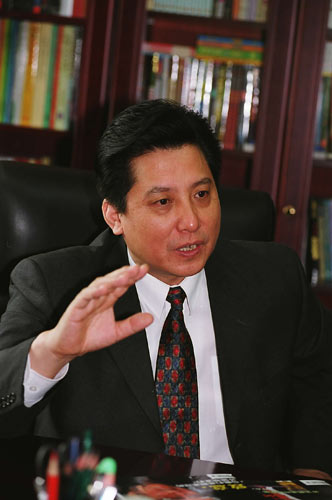
Notes: Guo Xiaoyong is one of the Vice Presidents of China International Publishing Group and Vice Chairman of the Translation Association of China (TAC). After graduating from Shanghai International Studies University with a major in Arabic, he worked with Xinhua, the official Chinese News Agency, as translator, editor and journalist. He continued his studies in Arabic and Arab culture in Kuwait University from 1980 to 1982. He served as a correspondent for Xinhua in Beirut from 1985 to 1988. In 1991, he was sent to the Gulf in charge of coverage of the Persian Gulf War.
The following is an edited transcript of an interview by China.org.cn with Guo Xiaoyong.
China.org.cn: The media plays an indispensable role in exchanges between different cultures, and translation is a vehicle for intercultural dialogues. So what do you think of the connection between translation and media?
Guo Xiaoyong: The theme of the World Congress of FIT (International Federation of Translators) to be held in Shanghai in August is translation and diverse culture. Translation has a close relationship with the media, since the translator has the same objective as the journalist: to promote people’s mutual understanding and communication; to document human civilization and culture; to record the progress and development of human society. Nowadays, considering the diversity of culture, the translator and the journalist face a task particularly full of daunting challenges, and the opportunity for success as well. We need to come together with our counterparts in other countries to discuss the role of translation in press and publication while enhancing the quality of translation to aid media development.
Over the last 30 years, I have grown to feel that a capable correspondent should have a good command of the local language and culture. But a correspondent should be more than a good translator, because translation is only one of the fundamental elements that make a good correspondent. In addition to an ability to produce faithful, coherent and elegant translation, a correspondent should have a good nose for news and excellent writing skills. Moreover, the ability to observe, analyze and judge is required. For example, if an interview involves a speech made by a foreign leader, you should first pick out some passages of his speech, translate them accurately, and then use them as quotes in your report.
China.org.cn: Would you please talk about your experiences as a journalist with regard to the connection between media and translation?
Guo Xiaoyong: In 1985, I arrived in the hamlet of Sayda in southern Lebanon for an interview. Back then, the Israel troops had just retreated from the area but the smell of gunpowder still hung in the air. The local dialect was so obscure that the Lebanese official accompanying us couldn’t understand it. We had to find a local to act as our interpreter. The episode left me convinced that mastery of language is a must in an interview regardless of any of a journalist’s other capabilities.
I would also like to share another experience I had during my stay in Lebanon. The international community focused much attention on Hezbollah (Party of God) during the 1980s. An opportunity presented itself to me. Fadlallah, regarded as the spiritual leader of Hezbollah, accepted an interview with us. I went along with two colleagues. I was the only one of the group who could speak Arabic. On entering the heavily guarded headquarters of Hezbollah, I greeted Fadlallah in Arabic, which made him think all of us understand Arabic. I asked the questions and he answered, all in Arabic. I had to interpret the interview to my bewildered colleagues on the spot.
However, the interview and the report turned out to be a success. Once again, I learnt that a mastery of local language is of great importance to the correspondent.
During the Persian Gulf War, the whole world was watching what stance a certain western nation would take against Kuwait. After a public meeting at which the Foreign Minister of Kuwait and a high-ranking official of the western nation were both present, I went over to the Minister and plied him with questions in Arabic. That proved to be a great coup. I got a scoop for Xinhua, and my foreign counterparts who couldn’t speak Arabic were filled with envy.